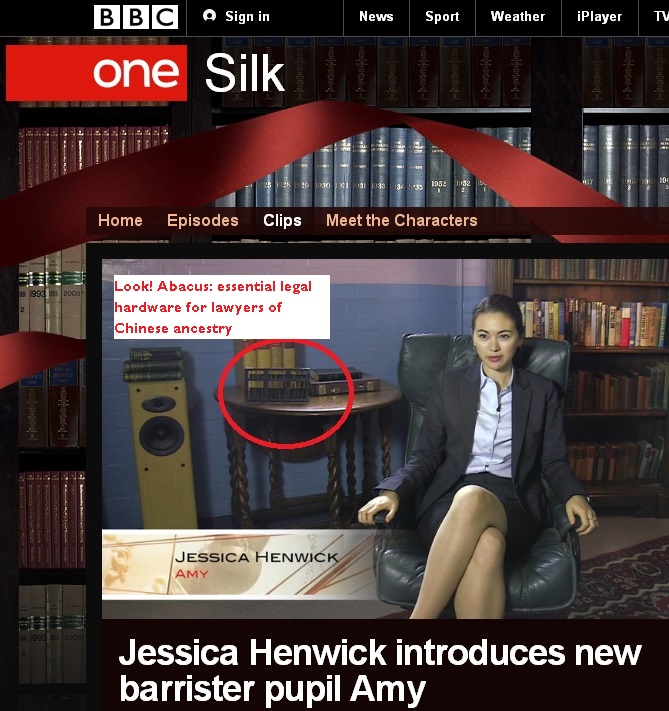Silk – where strife imitates art
How does a prime time TV series about the law satisfy both the public curiosity about the legal profession and its practices, and the respect of practitioners themselves who would like to see a mirror held up to their nature? And just how true-to-life can the characters get when one of them steps out of… Continue reading
How does a prime time TV series about the law satisfy both the public curiosity about the legal profession and its practices, and the respect of practitioners themselves who would like to see a mirror held up to their nature?

And just how true-to-life can the characters get when one of them steps out of the fictional box and appears in a public demonstration of lawyers, protesting against the legal aid cuts imposed by the Secretary of State for Justice, as Silk star Martha Costello (played by Maxine Peake) did at last Friday’s so-called “Grayling Day” march?
Various lawyers on the march took “selfies with Martha” and published them on Twitter; but this solo portrait, circulated by Sean Jones @seanjones11kbw has a timeless quality which sets it apart from the rest.
What lawyers think and what the public sees
For the legal profession, the big issues surrounding law these days are to do with cuts, and costs, and QASA. Drop the words “LASPO” or “Jackson” or “Mitchell” into the conversation, or the regulatory hurdle-race known as the Quality Assurance Scheme for Advocates, and ears will prick up, hackles rise, and frowns descend on otherwise tranquil faces.
But for the general public, the big issues of law are these: sentencing (too lenient); right to die (easy for you to say); professional ethics (how can you act for them if you know they’re guilty?) and human rights (I’m entitled, you’ve got some nerve, and he wouldn’t have had them back home so why should he have them here?).
For a prime time TV series about the legal profession, now in its third series, to ignore the public view about what is interesting about law would be a mistake. So SILK needs to tackle those issues that tickle that public consciousness. And Martha needs to wear lipstick.
Never mind that you never see female QCs strumpeting their way into a crowded courtroom faced up like Marilyn Monroe, the character of Martha Costello demands not just silk but war paint, a sort of legal woad before she goes into battle against her inevitably male opponents. And on the other side, the CPS apparently being reduced to hiring the only other QC in town, stands the smoulderingly determined-looking (but a bit weak underneath) Clive Reader, offering backhanded compliments and forehand smashes that somehow, in the end, drop uselessly out of court. Nor is he above the sudden, impetuous seize-n-snog routine, which Martha seems to like, and few QCs in actual practice can recall having tried either in the Royal Courts of Justice or the Devereux pub, but nevertheless find their way into Peter Moffat’s well-boiled script.
The adversarial system: plotting and rivalry galore
If you’ve watched SILK from the start, you’ll recall that the first series was all about barristerial rivalry – an upstairs battle for QC status, fought out between the two main characters (Martha, played by Maxine Peake, and Clive, played by Rupert Penry-Jones) and a downstairs battle for tenancy between the pupils in chambers, one of whom is forced by penury to shop-lift a wig before he can appear in court. Behind them all, wheeling and dealing, is the string-pulling senior clerk, Billy Lamb (played by Neil Stuke). Shoe Lane chambers seemed a thriving set, there was an impression of busy-ness and hive-like activity.
But as the series has progressed, the clerks room seems to have got bigger (and more interesting) and the members of chambers rather fewer. There’s a junior clerk called Jake (played by Theo Barklem-Biggs) who seems a bit dozy, but harbours feelings of love and ambition that fail to find fruit in Shoe Lane, so he looks elsewhere. There’s also now a practice manager called Harriet (played by Miranda Raison), full of modern marketing bullshout, and a new kind of deals-done chutzpah, who provides backroom Billy with his modern-day nemesis. She’s pro-prosecution, whereas he wants chambers to be a defendants’ set.
Among the actual practitioners, the pupils from series one have disappeared (I rather miss Nick Slade, played by Tom Hughes); there’s now a new tenant or squatter or third six pupil (it’s not clear which), called Amy Lam (played by Jessica Henwick), who hangs around Martha (even though, as a silk, she can’t actually have a pupil) and suffers various beginner-indignities, like being slapped down by magistrates and hit upon by the senior clerk in a rather antediluvian manner (something of a rave from the grave, this, as a plot manoeuvre). And just in case you didn’t realise Amy is of Chinese ancestry, there’s a handy clue supplied in the abacus casually left lying on the table next to Jessica in her interview on the Silk website (see image). A gift from the stereotyping pool perhaps.
 Since Series 2 there’s also been another senior (but not silk) barrister, Caroline Warwick, played with viper-like deadliness by Frances Barber, whose character seems to combine the illustrious defects of a society alcoholic from a Noel Coward play with a demon queen from a Webster revenge-tragedy. And when head of chambers, the somewhat dry old stick Alan Cowdrey, played with injured aloofness by Alex Jennings, decides to throw in the towel and accept an invitation to put his bum on the Bench, it is Caroline who unexpectedly throws her wig into the ring, along with the more obvious candidacy of Martha (backed by Billy) and Clive (backed by Harriet), to replace him.
Since Series 2 there’s also been another senior (but not silk) barrister, Caroline Warwick, played with viper-like deadliness by Frances Barber, whose character seems to combine the illustrious defects of a society alcoholic from a Noel Coward play with a demon queen from a Webster revenge-tragedy. And when head of chambers, the somewhat dry old stick Alan Cowdrey, played with injured aloofness by Alex Jennings, decides to throw in the towel and accept an invitation to put his bum on the Bench, it is Caroline who unexpectedly throws her wig into the ring, along with the more obvious candidacy of Martha (backed by Billy) and Clive (backed by Harriet), to replace him.
In other words, the big rivalry this time around is for the post of head of chambers. Forget tenancy, forget silk, this is the big prize. But where are all the other barristers? This is supposed to be a thriving set, yet we have barely seen anyone else in chambers or court, or even loitering in the clerks’ room angling for returns. It’s a bit weird, and somehow reminiscent of Garrow’s Law, where the 18th century English Bar seemed to comprise just two barristers, Garrow and his regular forensic squash partner, Silvester.
Or perhaps this is what all chambers will be like, once the cuts have taken their course, and the work has dried up: top heavy, no mid-list, and overburdened with support staff and compliance drones.
What do the bar think?
From the first series, barristers have been mesmerised by Silk, unable to look away while they count and recount its errors and improbabilities. They even tweet their observations with gleeful indignation, or affectionate exasperation, while the program is on, using the hashtag #silk. It’s all rather hilarious. Last Monday’s comments included the following:
- Have prioritised #silk over knowledge hub. Am thinking that this was a mistake. It’s dire
- Why has Clive brought Stones ‘Justices’ Manual to the Old Bailey? Nipping out to do a private driving appeal in the afternoon? #silk
- As Maxine Peake was so kind to help fight @saveUKjustice I shall be directing all #silk realism matters to @rpenryj tonight
- Frankly I don’t care whether it’s realistic, it’s blimmin brilliant #silk
- #silk Achieving WORST evidence interview
- I don’t think Billy has been on the diversity training course. #silk there’s a harassment case looming
- We have now descended into total make believe. This is pure drama. Technology working in court without a breakdown. #silk
- That’s it Martha, forget your instructions. SEEK THE TRUTH MARTHA, LET THE TRUTH SHINE #silk
- Maybe the mother could have checked out the age of criminal responsibility instead of falsely confessing to murder to save her 7yo son
- [the commentator] notes that all sensible lawyers have stopped watched and tweeting about #silk
- Just watched #Silk. Can’t work out which is funnier – The program’s mistakes or [another commentator’s] exasperation on Twitter…
And yet, they were happy enough, indeed delighted, when Maxine-as-Martha stepped out of the box and into real life to parade before the cameras for the benefit of the Grayling Day protest (as some of the above tweets demonstrate). When I pointed out this irony, on Twitter, I was corrected; it wasn’t Martha they were carping about during the programme, or even her role; it was the script she’d been given. So I wonder where she got the script for her appearance outside the Houses of Parliament on Friday.
Are they right to complain?
Fans of Shakespeare generally overlook the historical inaccuracies in his plays, on the grounds that if anyone is entitled to a bit of poetic licence, it ought to be the national poet. People don’t complain that “that is not what kingship is really like”: where are the cringing courtiers helping the king to wipe his bottom and pass him his pants? Let alone turning down his bedsheets and warming the feather mattress before the head that wears a crown can slip into bed and lie uneasy on its pillow? Realism is not required.”
“In the same way, I think Peter Moffat should be given a bit of licence, to produce with the raw materials of the legal profession something that the viewing public will understand and thrill to as a depiction of law in action without confining it to documentary accuracy. And if the production team chuck in the odd gavel (not used in this jurisdiction) or a redundant copy of Stones Justices Manual on the Bench of the Old Bailey; if, in short, the silk is just a little bit nylon… well, who are we to complain?
PMM
ps for a more detailed (and better informed) critique of this programme: The UK Criminal Law Blog’s review here.